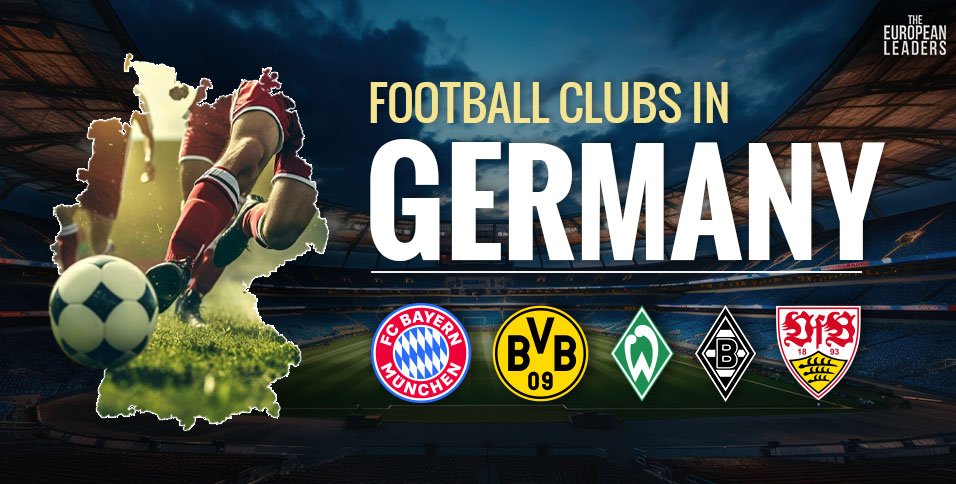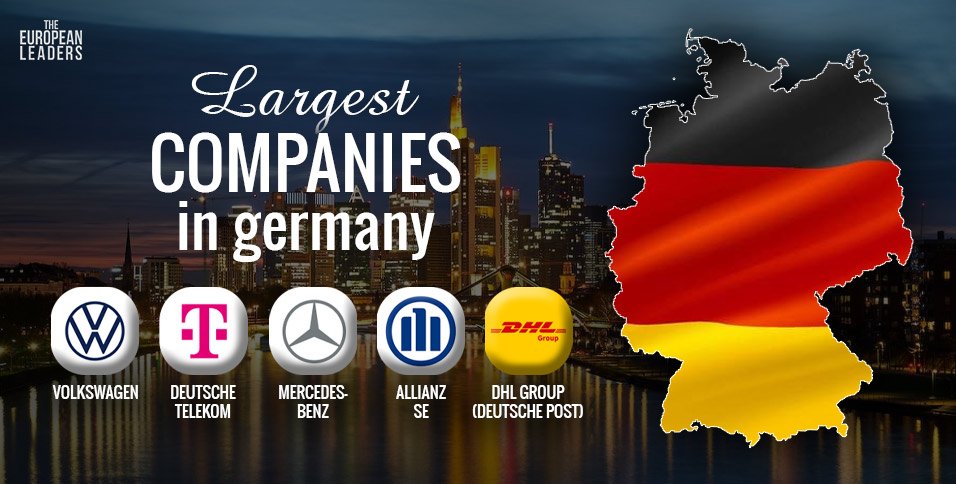Germany. When you think of this place, you probably picture brilliant cars, maybe some fantastic places, but for millions, there’s something else that truly dominates, which is football. Seriously, a massive 57% of the population? That’s practically every family that’s glued to their television screen, isn’t it? The roar of the crowd, the tension of a close game – it’s infectious! And naturally, in a football-mad nation like Germany, some clubs have simply risen above the rest, consistently bagging the biggest titles. And that also shows the deep love and the roots of the sports in the German culture. But it’s not just about the game, they have their own leagues like Bundesliga and all, where it’s the clubs that dominate and capture the hearts of the Germans and fans across the globe. So, what are we waiting for? Let’s dive straight into the top 5 most successful football clubs in Germany, the real kings of the German game, shall we?
Here are the 5 most successful football clubs in Germany
| Clubs | Total Trophies |
| FC Bayern Munich | 67 |
| Borussia Dortmund | 16 |
| Werder Bremen | 11 |
| Borussia Mönchengladbach | 10 |
| VfB Stuttgart | 8 |
1. FC Bayern Munich
Founded in 1900 by eleven football players under the management of Franz John, Bayern Munich. In 1920 it had 700 members — the biggest club in Munich. By Bayern’s promotion to the 1965, they are not included in the first tier, which was the Bundesliga when it was launched by announcement as from 1963. It has been a juggernaut German football club since then.
Bayern surpassed their accomplishment in 2020 by accomplishing the hexa (the only other club to do so was Dundalk). They did win the Bundesliga, DFB-Pokal, and Champions League in a single season and were also top dogs in the domestic Supercup, UEFA cup winners, and FIFA Club World Cup. Moreover, they won their sixth Champions trophy and second treble that year.
Key moments in the club’s journey include:
- 1900: Formation
- 1932: First German championship
- 1957: First DFB-Pokal win
- 1965: Bundesliga promotion
- 2020: Historic sextuple
- 2024: Emotional farewell to Franz Beckenbauer
Bayern holds several records:
- 33 German titles, including 11 consecutive wins (2013–2023).
- 20 DFB-Pokal victories.
- Leading the all-time Bundesliga table with 4,125 points.
- 14 international trophies—the most by any German football club.
- One of only two clubs to win the sextuple.
- Gerd Müller’s records:
- 565 goals in all competitions
- 398 league goals
- 365 Bundesliga goals
As we all say, the club is either remembered by the titles or the way they do things for others beyond the ground. And I am impressed that this particular club has done both. Bayern’s youth academy has given the world talents like Thomas Müller and David Alaba. And unlike most big clubs, they’re fan-owned—meaning their decisions are for football, not just profits.
2. Borussia Dortmund
Founded in 1909 by eighteen young men who were fed up with the church-affiliated football club of Borussia Dortmund. The journey began on December 19, 1909, with one of the largest football clubs in Germany on their journey.
The great time of Dortmund was in the 90s. In 1995 and 1996, Dortmund won back-to-back Bundesliga titles with Ottmar Hitzfeld. The club reached its zenith in 1997 by making the UEFA Champions League final and then the Intercontinental Cup.
Some of Dortmund’s iconic moments include:
- 1962: Bundesliga creation hosted in Dortmund
- 1966: First German team to win the European Cup Winners’ Cup
- 1997: Champions League and Intercontinental Cup triumph
- 2013: UEFA Champions League final appearance
- 2024: 50th anniversary of the Westfalenstadion, home of the Yellow Wall
The club also holds several records:
- 8 German league titles.
- 1966: First German club to win a European trophy.
- Ottmar Hitzfeld: Most successful coach with two Bundesliga titles and two Supercups.
- Michael Zorc: Most appearances with 572 games from 1981 to 1998.
Here’s what truly makes Dortmund special. Unlike most football clubs in Germany, they’re built on passion. The Yellow Wall, their 25,000-strong standing section, creates an atmosphere no other club can match. And despite being a global powerhouse, Dortmund stays true to its roots—developing young talent and playing fearless, attacking football.
3. SV Werder Bremen
February 4, 1899. A day when a new club entered the green field with the founders being just 16 years old. Werder Bremen. They had won a football in a tug-of-war tournament. Originally named FV Werder Bremen, the club changed to SV Werder Bremen in 1920. The name “Werder” comes from the riverside field where they played their first matches. Bremen was also one of the founding members of the Bundesliga, competing in 60 league campaigns.
The club’s peak success came in 2003/04 under Thomas Schaaf. That season, Bremen secured the Bundesliga title and the DFB-Pokal, achieving a domestic double.
Some of Werder Bremen’s most memorable moments include:
- 1961: First German Championship title
- 1992: Victory in the European Cup Winners’ Cup
- 2004: Bundesliga and DFB-Pokal double win
Bremen also holds several records:
- 4 Bundesliga titles
- 6 DFB-Pokal victories
- 1992 European Cup Winners’ Cup champions
- Claudio Pizarro: Club’s all-time top scorer
Considering what makes Werder Bremen different in Football clubs in Germany to the others, their never-say-die mentality is their secret. Since their highs, their consistent attacking approach and belief in signing underage talent have seen them as a club. The roots in their riverbank and the fans who hold on to their long term allegiance make them more family than just a team, that is the passion and perseverance.
4. Borussia Mönchengladbach
Borussia Mönchengladbach was founded on 1st of August 1900, originally known as Borussia München Gladbach. The name “Borussia” comes from the Latinized form of Prussia (which was and still is the popular name for football clubs in Germany). By 1912, the club had regional popularity and became an official member of the Westdeutsche Spielverband association; it had risen to the highest rank so far. Gerahardo Promoted Gladbach to the Bundesliga in 1966.
They won the football in Germany in the 70s as a golden era for the club. They finally won the Bundesliga with their first title in 1969/70 from Bayern Munich. In the following years, they successfully defended the Bundesliga championship. From 1974 to 1977, Gladbach added three Bundesliga titles in a row to the Euro Cup and UEFA Cup, as well as finishing as runner-up in the European Cup last Platz.
Some of Gladbach’s most iconic moments include:
- 1960: First German Cup victory (3-2 vs. Karlsruher)
- 1973: Netzer’s legendary winning goal in the DFB-Pokal final
- 1978: Historic 12-0 victory over Borussia Dortmund—the largest Bundesliga win ever
- 1975 & 1979: UEFA Cup triumphs
The club holds several records:
- 5 Bundesliga titles
- 3 DFB-Pokal victories
- 2 UEFA Cup titles
- 12-0 victory over Dortmund—the biggest Bundesliga win in history
The silverware is what makes Gladbach so special, not the fact that they are risk risk-taking, aggressive side. The “Foals” (swift/hard/energetic unpredictable play) have been the daring outsiders that the heavyweights have had to worry about since the very beginning. They may be one of the biggest football clubs in Germany, both in football and football fans, because of their brave football even today.
5. VfB Stuttgart
VfB Stuttgart was founded in 1912 through the merger of Fußballverein Stuttgart and Kronen-Club Cannstatt. The club’s early years were shaped by two World Wars, but it later became a founding member of the Bundesliga in 1963. Stuttgart also has departments for athletics, field hockey, table tennis, and fistball, making it more than just one of the leading football clubs in Germany.
The club’s golden era came in the 1950s, winning two national championships and two DFB-Pokals. Their most recent Bundesliga title came in 2007, clinched with a dramatic final-day win against Energie Cottbus. The 2023/24 season also stands out as one of the club’s most successful campaigns.
Some of Stuttgart’s most iconic moments include:
- 2007: Final-day win to claim the Bundesliga title
- 1989: Reaching the UEFA Cup final
- MHP Arena: The first stadium to host 1,000 Bundesliga matches
The club holds several records:
- 5 German championships
- 3 DFB-Pokal titles
- 2 UEFA Intertoto Cups—the most by any club
- 4th place in the all-time Bundesliga table
It is not deserved by the titles alone that truly set VfB Stuttgart apart as a club. Again with the youth academy, they have brought us world class players in Mario Gomez and Timo Werner, who would go on to become international stars. With their rabid fanbase and flamboyant nature, this club is one of the most exciting football clubs in Germany every season.
Key Takeaways
Observing these top football clubs in Germany reveals diverse routes to triumph, offering real-world lessons. Their journeys highlight key principles worth noting.
- Bayern’s Blueprint: Their fan-focused ownership and relentless winning show how a strong culture and long-term vision can breed sustained dominance. It’s a compelling model.
- Dortmund’s Fan Fire: The electric atmosphere fueled by their supporters underscores the powerful bond between a club and its community – a vital ingredient.
- Bremen’s Youth Trust: Their history of attacking football and nurturing young talent emphasizes the value of investing in potential and sticking to a playing identity.
- Gladbach’s Boldness Pays: Their legacy of daring, attacking play reminds us that challenging norms and taking calculated risks can lead to significant success.
- Stuttgart’s Resilience Matters: Their ability to bounce back and develop talent highlights the importance of perseverance and a clear long-term plan.
Personally, the variety in their paths to success is the biggest takeaway. These stories offer valuable food for thought on leadership, community, strategy, and the sheer power of passion in reaching the top.








